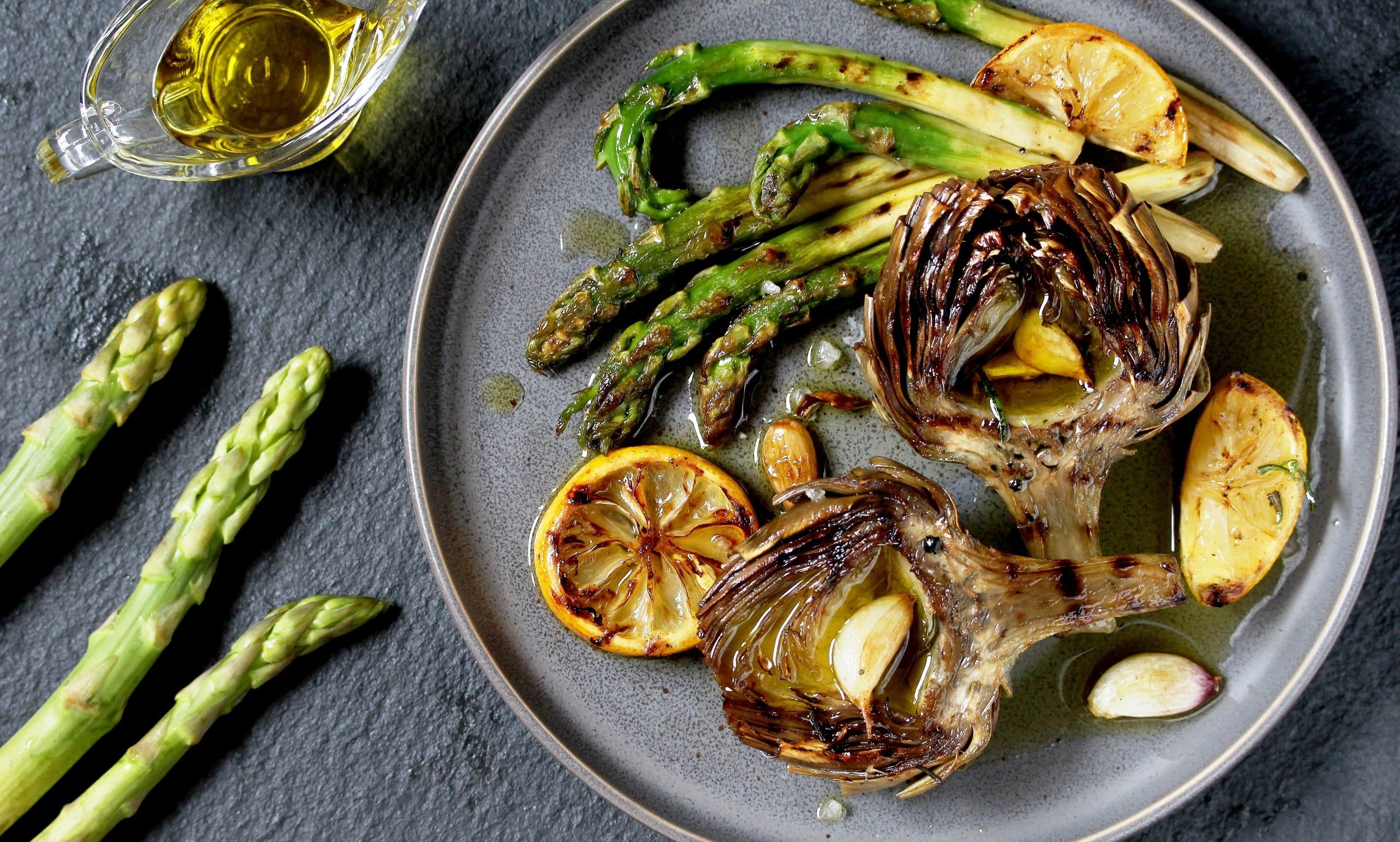How often do you consume artichokes? Once per week, month, or maybe you are going to start eating artichokes only after reading this article. Like many other vegetables, an artichoke has got valuable vitamins and minerals which can sustain a healthy immune system and support general well-being.
Get your personalized
meal plan!
People who trek through markets and grocery stores rarely pay attention to the artichokes desperately waiting to be picked up by consumers. This is rather weird though because artichokes are not only excellent for health, but take so little effort to prepare.
Lucky for you, today we are going to cover artichoke benefits – important reasons to add an artichoke to your weekly meals. In this article you will also discover the possible side effects of the vegetable, learn about another kind of artichoke – Jerusalem, and the possible benefits of artichoke extract.
And finally, you should get the hang of preparing the vegetable itself so that it doesn’t lose all the essential nutrients and gives an earthy fresh taste to your meals.
What Kind Of Vegetable Is Artichoke?
There was one legend according to which the powerful god of thunder and lightning Zeus got rejected by the object of his affection. As a punishment, Zeus decided to take revenge by turning that person into a thistle (10). Fortunately, this is not the real story of how the artichoke plant was created.
So, what is an artichoke and how do we get it?
It is funny to observe how some vegetables appear on this Earth. Artichoke is not an exception since it is the immature flower bud of a thistle. This means we are consuming the part of a flower before it blossoms.
The artichoke is used in the culinary world as an addition to different dishes and for some beginners, this vegetable might seem challenging to prepare. The artichoke plant consists of the outer leaves which have thorns on the tips. You can consume the base of the leaves and the innermost leaves.
Under the leaves, you’ll discover a choke on top of the heart. People usually enjoy the heart which is the meatiest part of the plant.
The artichoke plant is growing in the United States, primarily in California with more than 80 percent of the domestic crop coming from Castroville: the “Artichoke Center of the World”. The crops can be also found in Spain, Italy, and France who supply this vegetable to other parts of the world.
The leaf, root, and stem can be used to make extracts (2). Those who can’t stand the taste of this plant can take advantage of artichoke extract which is sold in capsules or gelcap forms.
Read More: Walking Backward Benefits For Your Body: Explore Creative Physical Activities
Are Artichokes Healthy For You?
Being used in both traditional medicine and culinary artichoke health benefits are versatile. This little bud brings together so many beneficial things when we cook it well. Here are the top 7 major artichoke plant benefits.
- May help Regulate blood pressure. As we know, high blood pressure negatively affects our well-being and may increase the risk of heart diseases (5). One study evaluated men with mildly high blood pressure who consumed artichoke leaf juice daily for 12 weeks and compared them with those who received a placebo. During this time the participants in the artichoke leaf juice group noticed a reduction in both systolic and diastolic blood pressure (1). Studies are still being conducted to understand whether artichokes can actually help lower blood pressure. It’s thought that the potassium in artichoke also may contribute to lowering blood pressure.
- Might improve digestive health. Artichokes are high in fiber which is beneficial to the digestive system. It promotes friendly gut bacteria and prevents or alleviates constipation. Artichoke extract may be helpful during some cases of bloating or nausea by increasing bile duct secretion (7). Always talk to your doctor before taking a supplement to address any medical condition.
- Can be included in a weight loss diet. Artichokes are low in fat and calories while being high in fiber, which makes them a good fit in any weight loss diet.
- Might lower bad cholesterol and increase good cholesterol. As specified by one study, 143 adults with high cholesterol took artichoke leaf extract or placebo daily for six weeks. As a result, total and “bad” LDL cholesterol decreased by 18.5% and 22.9% in the artichoke extract groups, which were significantly greater than in the placebo group (3). This is just one study, and it doesn’t mean we should all start taking artichoke extract pills. If you have high cholesterol, talk to your doctor about treatment options.
- Might reduce the risk of cancer. Artichoke contains plant-based bioactive compounds, some of which act as l antioxidants, like rutin, quercetin, silymarin, and gallic acid which may theoretically have anticancer effects (9). However, there are no human studies on this, which means that more research needs to be done.
The number of nutrients in one medium artichoke plant (5):
| Calories: | 60 |
| Fat: | 0 grams |
| Carbohydrates: | 13 grams (including 7 grams of fiber) |
| Protein: | 4 grams |
| Sodium: | 120 milligrams |
Are Artichokes Good For Your Liver?
The liver is an essential organ in the human body that is responsible for the processing of nutrients and detoxification, among many other functions. Hence, it is essential to support this organ with healthy habits.
Artichoke leaf extract may be a helpful tool for maintaining a healthy liver. Animal studies have suggested that artichoke leaf and root extracts may have a protective effect on the liver (9).
In one human study in 90 people with non-alcoholic fatty liver disease, those who took 600 mg of artichoke leaf extract daily for two months showed signs of improved liver function compared with those who took a placebo (3).
These preliminary results suggest that the artichoke plant may have benefits for the liver. However, more research needs to be done in order to fully discover the effects of artichoke extract on the liver.
BetterMe app will provide you with a host of fat-frying fitness routines that’ll scare the extra pounds away and turn your body into a masterpiece! Get your life moving in the right direction with BetterMe!
Are Artichokes Inflammatory?
Our body has a complex system to defend itself from external pathogens and irritants. Pathogens are bacteria and viruses that cause infections. When the body detects the irritant it tries to remove it by launching a biological response – beginning with inflammation.
Acute inflammation is a necessary part of the immune response. However, chronic inflammation is associated with obesity and certain chronic diseases such as type 2 diabetes and heart disease.
Artichokes are not inflammatory. It is thought that eating a high fiber diet may help reduce inflammation, and artichokes are high in fiber. Artichokes may even have some specific anti-inflammatory properties, although research on this is still limited.
What Are The Side Effects Of Artichokes?
The benefits of artichoke extract show that this plant can be easily consumed as food or its extract taken as a supplement. However, when we overdose on anything we can end up with unpleasant consequences. Moreover, our bodies might even negatively react to healthy food. Among the most common artichoke side effects are:
- Upset stomach
- Diarrhea
- Belching
- Gas or bloating (2).
These side effects are likely related to the fiber in artichokes, and can create quite uncomfortable feelings. If you are increasing your fiber intake, it’s best to do so gradually to allow your body to adjust. Moreover, people allergic to daisies, marigolds, and other similar plants can have a negative reaction to artichoke consumption. Usually, this reaction is mild, causing loose stools or upset stomach.
Read More: The 7 Different Types Of Stretching Exercises: How To Do Them And Their Benefits
Are Jerusalem Artichokes Good For Health?
Jerusalem artichoke is not the same as a simple artichoke. Also known as sunchoke or sunroot, it is not related to artichokes. Jerusalem artichoke is a great source of vitamins and minerals. They include iron, magnesium, vitamin B6, vitamin C, and potassium. People who don’t get enough of any of these vitamins or minerals would be happy to add Jerusalem artichokes to their meals.
Benefits
Jerusalem artichoke’s benefits may improve your general health and give you energy for completing difficult tasks. Among purported benefits of Jerusalem artichokes are:
- Gut health improvement. Jerusalem artichoke has a beneficial inulin fiber which is good for your gut health. It acts as a prebiotic, which stimulates the growth of beneficial bacteria. This good bacteria helps in a number of ways, including preventing the growth of bad bacteria, possibly reducing inflammation in the gut, supporting digestion, and possibly regulating the immune system (4).
- Blood pressure regulation. As we have noticed, Jerusalem artichoke has potassium which is vital to regulating blood pressure. It balances sodium to promote fluid and electrolyte homeostasis.
- Cholesterol reduction. Jerusalem artichokes include fiber that may help with lowering high cholesterol, which aids in maintaining cardiovascular health.
Side Effects
Side effects of the Jerusalem artichoke are mostly connected to people who are allergic to inulin which is the component of the plant. Even if you are not allergic to inulin you might feel discomfort or even face digestive problems after consuming Jerusalem artichoke. The product can also cause gas and bloating. This can usually be alleviated by increasing fiber intake gradually, but if you think you are particularly sensitive to inulin or something else in Jerusalem artichokes, talk to your healthcare provider.
Betterme will keep you laser-focused on your weight loss journey! Nutrient-packed meal plans, fat-blasting workouts, galvanizing challenges and much more. Try using the app and see for yourself!
How Do You Prepare Artichokes?
You come from the grocery store with a full bag of artichokes, place them on the table and scratch your head thinking about how to cook them. Artichoke is a new vegetable for you and you might get perplexed at first by the looks and the sensations.
However, everything is simpler than it seems. After this step-by-step guide, you will become an artichoke profi who can deal with these plants fast and carefully.
Instructions:
- Pick off the lower leaves.
- Cut off the ½-inch top of the artichoke.
- Rinse the artichoke under cold water thoroughly. Gently open the leaves and wash them too. Close the tap and turn the artichoke upside down so that the excess water drains.
- Place the washed plant on the chopping board and squeeze lemon on top to prevent browning.
- Take kitchen scissors and snip off the tips from hard leaves.
- Steam the artichoke for 30-40 minutes.
After the steaming, you can try only the heart of the vegetable but it is preferred not to neglect leaves because a lot of nutrients are settled there. Many sources online can propose delicious recipes made from healthy artichokes. You can also eat them simply steamed. Many people like to dip the leaves in melted butter or drizzle them with olive oil, salt, and pepper.
One of the most popular recipes with artichokes is the healthy spinach creamy dip. This dish is a premium meal for your body because:
- It is a lower fat dish: Spinach artichoke dip usually includes such ingredients as shredded cheese, cream cheese, and even mayo which makes it super high in fat. In this recipe, cream cheese is substituted with low-fat greek yogurt and cottage cheese.
- Higher in protein: The greek yogurt and cottage cheese mix create a creamy taste and provide your body with protein.
Ingredients For Delicious Spinach Artichoke Dip:
- 12 oz of well-drained artichoke hearts
- 4 oz drained frozen spinach
- 1 cup of non-fat greek yogurt
- 1/2 cup small cottage cheese
- ⅓ cup grated parmesan cheese
- 1 cup shredded mozzarella cheese
- 1/2 teaspoon of pepper
- ½ teaspoon of onion powder
- ½ teaspoon garlic powder
Here Is How To Cook Healthy Spinach Artichoke Dip:
- Preheat oven to 400
- Drain spinach thoroughly. Use a strainer and a paper towel to remove the liquid from the vegetable.
- Mix all ingredients in the bowl.
- Pour dip mixture into a medium oval pan and bake at 400 for 30 minutes.
- Broil for 1-2 minutes before serving till cheese melts and becomes brown.
Voila. The creamy yummy spinach artichoke dip is ready to be served to your beloved ones (8).
| Calories | Carbs | Fat | Protein |
|---|---|---|---|
| 120 | 8 gram | 8 gram | 6 gram |
You can enjoy fresh spinach dip with pretzels, and chicken, or even place it on the cracker. If you want to prepare the mix ahead of time you can do this by combining the ingredients and placing them in the refrigerator. Fish the mix out of the fridge and bake it, following the instructions.
The prepared dip can stay in the fridge for 2-3 days. Plus, you can reheat the spinach dip in the microwave.
The Bottom Line
Artichoke is a healthy vegetable that can be found in the market or in the grocery store. People eat them steamed or use them as an ingredient in various dishes and artichoke extract can be recommended by doctors in the form of pills.
Artichoke benefits – important reasons to add artichoke to your weekly meals. As part of a healthy diet, the artichoke plant might help regulate blood pressure, positively affect the liver, might reduce the risk of cancer, and decrease bad cholesterol. Artichoke may also have anti-inflammatory properties.
The Jerusalem artichoke is not related to the typical artichoke. This ginger-looking vegetable may help improve gut health, lower bad cholesterol, and regulate blood pressure as part of a healthy diet.
People can prepare different healthy dishes with artichokes. One of the most delicious and healthy recipes is spinach creamy artichoke dip which can be served with chips, pretzels, or vegetables.
Consumption of artichokes may provoke such side effects as gas, bloating, upset stomach, and diarrhea. This is usually due to increasing fiber intake too quickly. People who prefer taking artichoke extract are advised to consult a healthcare provider.
DISCLAIMER:
This article is intended for general informational purposes only and does not serve to address individual circumstances. It is not a substitute for professional advice or help and should not be relied on for making any kind of decision-making. Any action taken as a direct or indirect result of the information in this article is entirely at your own risk and is your sole responsibility.
BetterMe, its content staff, and its medical advisors accept no responsibility for inaccuracies, errors, misstatements, inconsistencies, or omissions and specifically disclaim any liability, loss or risk, personal, professional or otherwise, which may be incurred as a consequence, directly or indirectly, of the use and/or application of any content.
You should always seek the advice of your physician or other qualified health provider with any questions you may have regarding a medical condition or your specific situation. Never disregard professional medical advice or delay seeking it because of BetterMe content. If you suspect or think you may have a medical emergency, call your doctor.
SOURCES:
- Artichoke leaf juice contains antihypertensive effect in patients with mild hypertension (2009, ncbi.nlm.nih.gov)
- Artichoke – Uses, Side Effects, and More (2020, webmd.com)
- Efficacy of Artichoke dry extract in patients with hyperlipoproteinemia (2000, ncbi.nlm.nih.gov)
- Gut Microbiota and Inflammation (2011, ncbi.nlm.nih.gov)
- Health Benefits of Artichokes (2020, webmd.com)
- Herbal medicines for the management of irritable bowel syndrome: A comprehensive review (2012, ncbi.nlm.nih.gov)
- Increase in choleresis by means of artichoke extract (1994, ncbi.nlm.nih.gov)
- MyFoodDiary (2022, myfooddiary.com)
- Pharmacological Studies of Artichoke Leaf Extract and Their Health Benefits (2015, ncbi.nlm.nih.gov)
- The Amazingly Delicious (and Healthy) Artichoke (2010, webmd.com)












